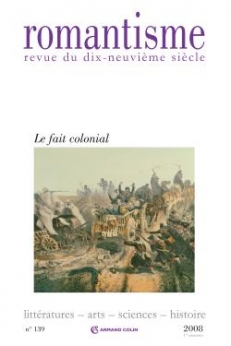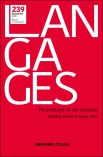
Romantisme n° 139 (1/2008)
Pour acheter ce numéro, contactez-nous
Recevez les numéros de l'année en cours et accédez à l'intégralité des articles en ligne.
Cet article envisage la question des enjeux spatiaux et territoriaux du débat colonial au moment de la conquête de l’Algérie. L’historiographie a souvent rappelé l’absence de projet colonial qui caractérise le débarquement à Alger en 1830, puis l’occupation des territoires de la Régence. L’incertitude sur le sort de l’Algérie devient d’ailleurs très rapidement le thème dominant du débat public et du débat parlementaire, et rend possible quantité de projets particuliers qualifiés d’occupation, de colonisation ou même d’agglomération à la métropole. Au-delà des argumentaires traditionnels qui opposent colonistes et anticolonistes autour des questions de coût, de rentabilité, de sécurité voire de moralité, le débat sur l’Algérie fait émerger toute une série de considérations relatives à l’étendue de l’espace à coloniser. De quelle Algérie parle-t-on ? Quelles doivent être les limites du territoire utile ? Quelles populations pour occuper quels espaces ? Les notions de colonisation restreinte et de colonisation étendue, les systèmes intermédiaires qui sont proposés, la question des frontières et du rôle de la Méditerranée sont finalement très importants dans le positionnement des acteurs politiques. Et c’est autour de ce débat sur la nature du territoire colonisable que se construit une représentation de la colonie algérienne, alors que le sens même du terme « colonie » est réinvesti.
This article deals with spatial and territorial issues within the colonial debate during the conquest of Algeria. The historiography often noted the absence of any colonial plan at the moment of the 1830 landing in Algiers, and during the occupation of territories of the Regency. The uncertainty about the future of Algeria, in fact, became very rapidly a predominant theme in public and parliamentarian debates, and paved the way for many different plans referred to as occupation, colonization or even agglomeration to the metropolis. Beyond the usual confrontation between pro and anti-colonization on issues of costs, profitability, security or morality, the debate on Algeria opens up a series of considerations on the extent to which space should be colonized. What is understood under the term Algeria ? What should be the limits of a useful territory ? What kind of population for what kind of space ? Eventually, the notions of restricted and extended colonization, the proposed intermediate systems, the issue of frontiers and the role of the Mediterranean, play a crucial role in the political positioning of all concerned actors. It is within this debate over the nature of the territory to be colonized that emerges a representation of the Algerian colony, thereby reinvesting the significance of the term “colony”.

